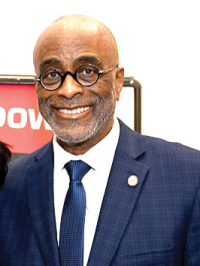March 13, 2024

The task force charged with making recommendations to city leaders regarding possible reparations for Black Bostonians will not complete its work by the end of this year as originally planned, its chair said last week.
Attorney Joseph Feaster, who oversees the task force, said the group is still gathering research in what is the first of three phases involved with creating its final report. “Unfortunately, the timeframes that were set forth in the ordinance were a bit ambitious,” Feaster said.
Mayor Wu appointed the task force last February to consider reparations for the descendants of enslaved people. Boston is one of the largest American cities undergoing such a review, with groups in Los Angeles, San Francisco, Detroit, St. Louis, Providence, and Northampton, Mass. also working to identify their respective cities’ ties to slavery and explore reparations.
In Boston, a city ordinance created the group and stated that its members should serve through the end of 2024, unless otherwise determined by the mayor.
The ordinance outlined that the group’s first phase of work – to research and document the city’s role in slave trade – was to be done by last June. However, the task force did not appoint researchers until last December. “While some people may be anxious, we’ve been at this for 400 years,” Feaster said. “So, I think I can take a year in order for us to do the appropriate research.”
In an emailed statement, a city spokesperson said the Wu administration continues to support the effort “to ensure that Boston delivers just and comprehensive recommendations. As the task force and research partners move forward with their critical work, the City understands that documenting Boston’s role in the trans-Atlantic slave trade and the legacies of slavery requires significant consideration, time, and resources,” the spokesperson wrote.
At a task force meeting in February, several attendees during public comment asked the task force to hold more community meetings about its work. And a group of activists has also been calling for additional opportunities for public input.
“There is no way that we will be able to achieve a substantive, robust, transparent reparations process with only the engagement of the task force,” said the Rev. Kevin Peterson, who leads the People’s Reparations Commission, a grassroots group calling for economic reparations. “The task force needs the energy, the creativity from community members who are in the grassroots, who can provide them with insights they’d never be able to achieve.”
Feaster said he did not support the task force deepening its community engagement efforts until its research phase concludes. “I don’t need to have that conversation until such time as I have the benefit of the researchers giving me some guideposts on how we approach the issue,” he said.
This story was published by WBUR on March 8. The Reporter and WBUR share content through a media partnership.


